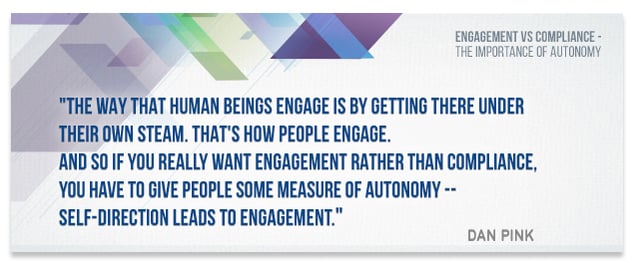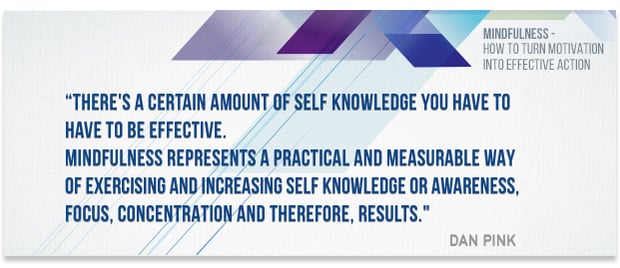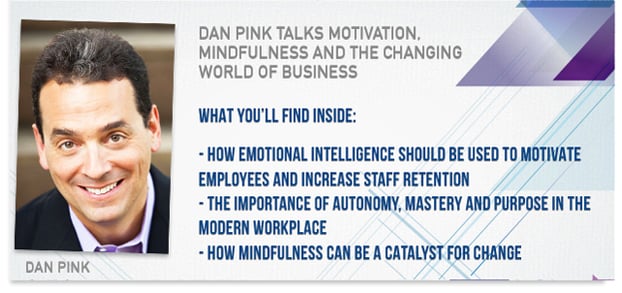
Feb 03 2019 | Tags: Mindfulness
Dan Pink’s Business Advice: Invest in Mindfulness
Dan Pink earlier this year at London’s EQ Summit - we found common ground in the idea that the business world stands at a watershed moment.
As more and more businesses realise the potential of engaging with mindfulness, a new road-map for prosperity is being formed.
According to Dan, ‘if you go out there, you can actually feel the wind blowing in a different direction. They might not be howling winds right now, but they are definitely blowing in a different direction.’

Motivation – Beyond the ‘if/then’ reward
Martyn: We are hearing on daily basis about staggering levels of disengagement in the workplace, with managers complaining that they can’t motivate employees and have problems retaining talent. Some people have argued that it’s a generational phenomenon, how do you see it?
Dan: I think we have a set of motivational mechanisms that have in many ways outlived their usefulness. As the nature of work changes so must the nature of motivation. The millennial generation, with its focus on meaning, choice and well-being requires different tactics, and a different mindset.
Organisations often use what I call the ‘if/then reward’, as in if you do this then you get that, and not only where it demonstrably works. The science is very clear, these kinds of rewards are very effective for simple, short-term, routine kinds of tasks but they’re far less effective for more complex, creative, conceptual things.
Up to this point a lot of mechanisms within companies have been based on control, yet this strategy has its limits. Human beings throughout history have had only two responses to control, they will comply or they will defy.
In many cases we misunderstand the mechanisms of motivation, choosing to focus on control and ‘if/then’ rewards when we should be focusing on actively engaging employees.
Our contemporary desires can only be fulfilled through a different model of motivation, one which champions self-autonomy rather than reward for compliance.

Why money isn’t everything – Internal vs Instrumental motives
Martyn: In your work you have challenged the idea that high pay alone is the prime driver of improved performance. How can we better understand the motivational mechanisms which will shape the way we motivate ourselves and our employees in the 21st century?
Dan: It is good to examine different types of motives. If you look at a study of the military academy West Point, where tuition was paid for in return for a certain length of service in the military, there were some interesting distinctions between groups with different senses of purpose.
Some people had ‘internal motives’ such as “I want to serve my country” or “I want to become a great leader”, whilst others had instrumental motives for example “I want my tuition paid for” or “it will help me get a job in the future”.
The major distinction was that the people with internal motives did better than the people with truly instrumental motives. This suggests that by switching emphasis onto what you are contributing and doing something you love, rather than focusing purely on achievement, you may actually experience much greater success.
Mastery & Purpose – Get better at something that matters
Martyn: ‘What else do we need to consider in terms of motivating the millennials?’
Dan: We need to bear in mind that this generation needs motivating and managing in a different way. In the US, millennials are far more purpose-driven than their parents were. We are used to thinking of the baby boomer generation as being very socially conscious and wanting to change the world however the data tells a different story.
Research from UCLA in Los Angeles comparing millennials and their parents at singular points in their life, at age 20 or 25, revealed that the current generation care a lot more about purpose and are trying to do much more purpose-driven things than their parents did.
Mastery is really important to millennials, they want to get better at something that matters. The only way to do this is to get feedback on how you’re doing, but unfortunately the workplace is basically a feedback desert.
Where this may not have been such an issue for past generations, the millennials won’t stand for it. They have lived their entire life in a world of rich, regular, robust, meaningful feedback where if you press a button something happens. You play a game and you get a score. You send a text, it gets there instantly.
In this context, expectations at work have also changed. Today’s workforce wants to develop mastery and they need feedback to do this. This emphasis on evaluation and improvement has the potential to fuel vast improvements and is something companies must take on board if they wish to retain talent.
Emotional Intelligence – the key to understanding motivation
Martyn: Another element in the changing world of business is the growing prominence of using Emotional Intelligence as a tool for improving commercial outcomes, which is an area of particular interest for me.
I use a model of ‘Emotional Capital’ to help companies to find better ways to work and generate greater sustainable profitability. In my view it is these emotional assets, the feelings, beliefs, perceptions and values that people hold when they engage with your organisation, which determine whether or not people will work well for you, buy from you, employ you and enter into business with you.
How does Emotional Intelligence fit into your view of motivation?
Dan: To be emotionally intelligent is in many ways a prelude to understanding deeper motivation.
People want to have sovereignty over their own life. They want to know why they’re doing something and to make a contribution. One area of Emotional Intelligence I am particularly interested in is asking are we emotionally intelligent about ourselves? Do we know what we’re worth?
We all have those moments where we might look at ourselves and ask questions like:
“What is it that I want to do with my life?”
“Why am I here?”
“What’s it all about?”
And the answers hinge on certain core principles:
“I want to make progress”
“I want to do something that matters”
“I want to have some control over when I do it”
I believe we do better ourselves when we treat our emotional intelligence with the same importance as our mental intelligence. Whilst blanket adoption of this idea may be some way off, its influence is certainly growing and as an increasing number of case studies show, it is having huge impact.
Mindfulness – how to turn motivation into effective action
Martyn: It is one thing to develop the best ways of motivating your employees but how can we go about turning that motivation into effective results?’
Dan: The practice of Mindfulness. I envisage this as an inevitable part of the transformation taking place in the world of work.

Mindfulness is almost becoming a form of hygiene in a way that brushing your teeth or exercising has become. I imagine us looking back at some point and saying ‘Remember when we didn’t talk about Mindfulness? Remember when people didn’t know how to think about the present?’
A New Landscape
Martyn: Why do you see these concepts as being such a big part of the future?
Dan: Because these ideas really do go with the grain in human nature, I think people are very receptive.
A new landscape is emerging where autonomy, mastery and purpose are driving us to achieve even greater things and Emotional Intelligence and Mindfulness are emerging as the two most effective tools for actually making change happen – and stick.
We have a unique opportunity for progress all round, what is good for our soul is actually now increasingly good for our workplace.









